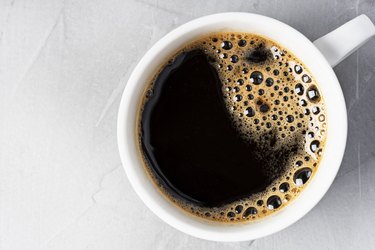
If your doctor asks you to fast overnight before a blood draw, don't be alarmed — this is common, and helps ensure your blood test results are as accurate as possible. You can typically still drink water, though, which is why you may be wondering if you can drink coffee before a fasting blood test.
The short answer? Typically not. That's because food and drinks (besides water) that you eat prior to a blood draw can influence the results of certain tests, according to the U.S. National Library of Medicine (NLM).
Video of the Day
Video of the Day
Here's everything you need to know about coffee before blood tests to help you prepare.
Tip
To fast effectively and provide the best possible blood sample, follow the instructions provided by your doctor to the letter.
Fasting for Blood Work: How to Prepare
Fasting is defined as eating and drinking nothing but water, according to the Mayo Clinic. These narrow parameters help you obtain the most accurate test results, as there are no outside substances that can influence the characteristics of your blood.
Still, fasting blood test requirements can vary based on the test, so it's always best to talk to your doctor to learn exactly which foods and drinks are off-limits leading up to the procedure.
Which Blood Tests Need to Be Fasting and Which Don’t?
Not all blood work requires that you fast beforehand, so it's possible you can drink coffee before certain blood tests.
According to the NLM, the most common types of fasting blood tests are:
- Glucose tests, which measure your blood sugar
- Lipid tests, which measure your cholesterol and triglyceride levels
In other words, skip the coffee before a glucose test (along with drinks that contain sugar or artificial sweeteners, like diet soda).
You also can't drink coffee before blood work if you're getting a combination of fasting and non-fasting tests — for instance, if you're getting your nutrient levels and glucose levels checked at the same time.
How Does Coffee Affect Blood Test Results?
This is why you can't drink coffee while fasting for blood work: Caffeine and other substances may get into your bloodstream and mess with your test results, per the NLM. This is even true if you prefer your java plain — you can't have black coffee when fasting for blood work, as it still contains blood-altering caffeine.
Can You Drink Coffee (or Anything Else) Before a Non-Fasting Blood Test?
If you aren't having any fasting blood tests, then it's typically OK eat and drink normally leading up to a non-fasting blood draw, according to the National Health Service. And yes — that means you can have your morning cup of joe (or tea) before your appointment.
If you're still not sure whether or not to fast, talk to your doctor.
How Long to Fast Before Blood Work
Your doctor will tell you what time your blood test is scheduled, whether to fast and, if so, how long you must abstain from eating or drinking (besides water) beforehand. Generally, though, you can expect to fast for eight to 12 hours (usually overnight), according to the National Heart, Lung, and Blood Institute.
Pro tip: Prepare for a water-only fast by eating a nutritious meal prior to the fasting period to help keep you fueled.
Typically, you can resume eating and drinking normally as soon as the blood test is over, according to the NLM, so you can pack a breakfast (and even an insulated bottle of coffee) to eat right after your blood draw.
Is this an emergency? If you are experiencing serious medical symptoms, please see the National Library of Medicine’s list of signs you need emergency medical attention or call 911.